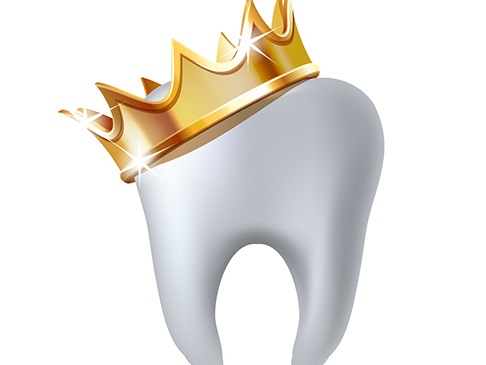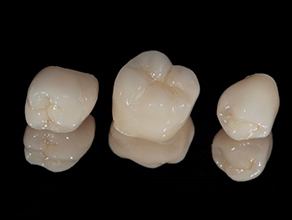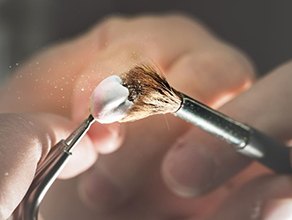Dental Crowns – Ledgewood, NJ
Reliable Repair for Broken or Cracked Teeth

When you have a tooth in major trouble but not yet past the point of no return, restorative dental treatment is usually the answer to get your smile on the road to recovery. Perhaps no solution offers a more reliable repair for broken or cracked teeth than dental crowns. At McCleaster Family Dental, we can provide an outstanding crown with options for the material used depending on what best suits your needs. Contact our team to schedule your consultation today!
Why Choose McCleaster Family Dental For Dental Crowns?
 Count on Advanced Restorative Dentist
Count on Advanced Restorative Dentist Proudly Accepts Dental Insurance
Proudly Accepts Dental Insurance Same-Day Emergency Appointments
Same-Day Emergency Appointments
What Is a Dental Crown?

A dental crown is a tooth-shaped cap placed over a tooth to restore its shape, size, strength, and improve its appearance. The crown, when cemented into place, fully encases the entire visible portion of a tooth that lies above the gumline. A crown can protect a weak tooth, restore a broken or worn tooth, support a tooth with a large filling, hold a dental bridge in place, cover a dental implant, or cover a tooth that is misshapen or severely discolored.
An ideal candidate for a dental crown is generally dealing with severe tooth decay or a tooth that is chipped, cracked, or misshapen. Simply put, there is an array of ways it can support your smile.
The Dental Crown Process

At your first appointment, your dentist will examine your tooth and file it down as needed. Metal crowns don’t need as much filing as porcelain crowns. They will take X-rays of the tooth and surrounding bone. Once the tooth is ready, your dentist will make an impression of it and the teeth above the crown so it correctly fits your bite.
Next, the impression is sent to a lab to create your crown, and you are given a temporary one in the meantime. A couple of weeks later, you return to your dentist’s office so they can remove the temporary crown, check the color, shape, and fit of your new one, and then permanently cement it in place.
Dr. McCleaster offers crowns made of either EMAX, zirconia, porcelain, gold, or porcelain-fused-to-metal. During your consultation, he will provide the requisite information for you to choose the material to suit your situation.
The Benefits of Getting a Dental Crown

If you need a dental crown and pass up the opportunity to do so, it could mean trouble. For damaged teeth, the tooth may chip or crack more. In some cases, waiting may lead to the need for a root canal. Some worn-down teeth may split, which may require crown lengthening or extraction.
But once you move forward with treatment, your crown can offer improved comfort and chewing ability. It delivers the protection your tooth needs to avoid severe damage or extraction. The versatility of a crown ensures it is a potential answer to many oral health concerns.
From an aesthetic standpoint, a crown is customized to blend in with surrounding teeth so it is virtually indistinguishable from your natural ones. A dental crown can boost your smile for more than a decade with proper care.
Understanding the Cost of Dental Crowns

The cost of dental crowns can depend on a few different factors. During your restorative consultation, we can share some specific numbers with you. We will also be happy to inform you about your payment options, such as insurance and third-party financing. We always aim to make the monetary aspect of care as easy as possible for our patients.
Factors that Affect the Cost of Dental Crowns

Some factors that can have a bearing on the cost of crowns include:
- Preliminary care. Some patients require root canal therapy or other services before a crown can be placed. Such treatments each incur their own fee.
- The material used to make the crown. We offer crowns made out of a variety of materials, including eMax, zirconia, porcelain, gold, and porcelain-fused-to-metal (PFM). Each type of crown comes with its own cost.
- The crown-making process. The steps involved in making a crown can affect its total cost. For example, dental laboratories charge fees that must be covered by the patient.
When it comes to dental crowns, keep in mind that cheaper is not always better. You want your new crown to look good and fit well. If it is not high-quality, it may interfere with your bite and not last as long as you wish it to.
Does Dental Insurance Cover Dental Crowns?

In most cases, yes, dental insurance does cover dental crowns. Usually, this procedure is classified as a major service, so around 50% of its cost may be covered, up to the amount of your policy’s annual maximum. (Keep in mind that if a crown is purely for cosmetic purposes, it may not be covered.) Our practice welcomes insurance, and our friendly team will do all they can to maximize your benefits.
Other Options for Making Dental Crowns Affordable

If you do not have dental insurance, or you will still have a high out-of-pocket cost after using your benefits, there are other provisions that may make it easier to afford your crown. For example, we welcome third-party financing from Lending Club and CareCredit. The application process is fast, and most patients are deemed eligible for a low-interest payment plan that fits within their budget.
Would you like to learn more about dental crowns and their cost? Our team is prepared to answer all of your questions. Call us today to book a consultation. We look forward to helping your smile look and feel its best!
Dental Crowns FAQs
Does It Hurt to Get a Dental Crown?
Similar to receiving a regular filling, Dr. McCleaster will first numb the area of your mouth that we’ll be working on so that you’re completely pain-free whenever we prepare your tooth. Afterward, however, it’s normal to experience some mild sensitivity for several days following your appointment, especially if you also underwent a root canal beforehand. The good news is that this should be short-lived and can easily be managed by taking over-the-counter pain relievers. Make sure to give our team a call if you notice any persistent or worsening discomfort so we can help.
Are Dental Crowns Permanent?
No, dental crowns are not designed to cover your underlying tooth forever. At some point, you’ll need to replace them with a new dental cap. Fortunately, with proper maintenance, you should be able to make the most of your restoration(s) for around 10 years or more. The only irreversible part of this treatment is that your enamel will not grow back on its own, so you’ll need to cover the tooth with a dental crown from now on. By practicing great oral hygiene and visiting us biannually, however, you can be sure to enjoy your improved and strengthened tooth for many years to come.
Do Dental Crowns Get Cavities?
Dental crowns are not organic like your natural teeth, so you should never expect them to become decayed or develop cavities. That said, this doesn’t mean your underlying tooth will be completely immune to bacteria. In fact, those with dental crowns still have about the same risk of decay as uncrowned teeth. That’s why you’ll want to practice good oral hygiene every day to minimize your risks in the long run. Simply brush, floss, rinse with mouthwash daily, and visit your dentist for checkups and cleanings every six months to effectively prevent cavities from forming.
Do Dental Crowns Feel Natural?
Your restorations should begin to feel much more natural after several days. The material is typically durable and can be made to mimic normal tooth enamel—both in looks and function! This means you shouldn’t feel much of a difference when doing normal daily tasks, such as eating your favorite meals. Furthermore, your dental crown should feel natural in the long run because our team makes sure that the cap can sit perfectly atop the tooth.
